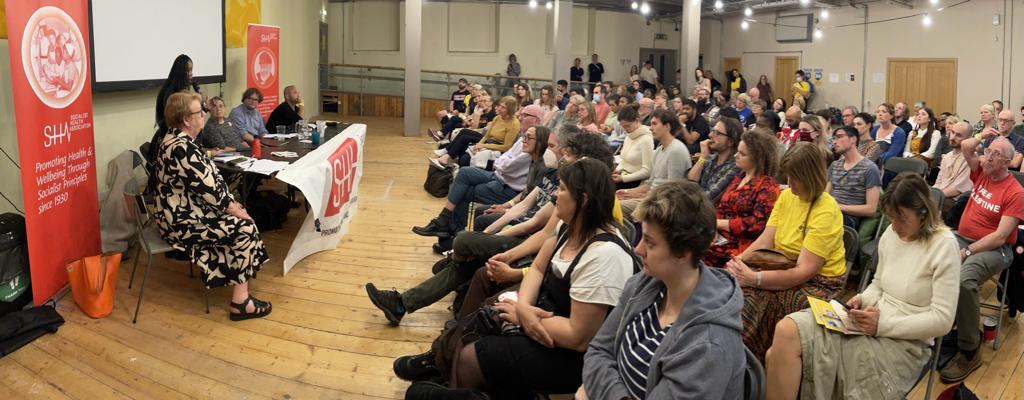Conference report from one of our activists.
The motions prioritised for debate, the speakers chosen, the subjects not to be discussed, the seating in the hall, the free conference passes for councillors, the exclusion of members from the platform, batting away of any questioning by members showed the iron control over conference exercised by the leadership. The large exhibition area next to the conference hall was awash with lobbyists vying to buy influence. They found a party more than willing to accommodate them.
Motions were rigged in various ways. The motions on the NHS were divided into two groupings. Voters were directed to prioritise the grouping favoured by the leadership which was called ‘An NHS Fit for the Future’ with motions sent in by 5 CLPs. This motion contained wishes without any policy, such as ‘Improve mental health services and cut waiting times,’ ‘train the next generation of doctors, nurses and community staff’.
The second grouping from the SHA and 14 CLPs, calling for renationalisation, ending privatisation and that MPs not take donations from private health care companies, was called ‘Health Services and Funding’. With no mention of the NHS in the title, it sounded like committee meetings and management speak.
The same division into two groupings occurred for social care. The motion chosen by unions was about fair pay and conditions and training of care working staff. Absolutely vital but no mention of ending the protifeering, unsafe private sector and establishing a public care service, funded from taxation and free at the point of use, which was in the grouping not selected.
Remarkably and without precident the National Executive Committee (NEC) overrode the Conference Arrangements Committee (CAC. whose job is to run the conference). The CAC did not want these two groupings. Apparently the General Secretary expalined that the NEC had a duty to intervene when the letter or the spirit of the rules were in jeopardy.
Housing had the highest number of motions sent in, 48 in total. This is the second year housing was not on the agenda. It appears calls for end to Right to Buy and to build council housing rather than ‘affordable’ housing are unpalatable for the leadership.
Defence which was a prioritised motion had submission from just one CLP, Ukraine, also a prioritised motion, had submissions from 3 CLPs. The motions on defence and Ukraine were substantially the same yet occupied two of the six motions available.
The conference Chair chose speakers who were mostly councillors or Prospective Parliamentary Candidates (PPCs) who dutifully repeated the party line … adding nothing. It appeared the speakers were all chosen beforehand. The arrangement of the hall meant unions sympathetic to the leadership, GMB and Unison were at the front of the hall and called regularly. More critical unions, Unite, ASLEF, CWU and FBU were tucked away at the back in the dark.
The meticulous planning by the party leadership to control conference proceedings points to the battles ahead for campaigners when Labour is in power. The Labour party has not committed to rebuild public services without the involvement of the private sector in, for example, the NHS, social care and schools. Labour has not committed to bring privatised services, rail, water, mail, energy back into public ownership.
As services are outsourced and vast amounts of money siphoned off to management consultants and to private providers of services, there will be fewer benefits for us all because of this arrangement..

